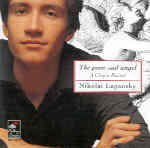The Poor, Sad Angel refers to Chopin through the eyes of George Sand. I imagine listeners are expected to keep this image in mind when listening to the present disc. To my ears, Nikolai Lugansky’s clean, orderly, and complacent artistry manages to transform Chopin’s music into easy, nonconfrontational listening. Take the opening F minor Fantasy (please!). Lugansky reduces Chopin’s dynamics down several notches and rarely supports crescendos with equal weight in both hands. Turn to Arrau’s Philips recording, and suddenly you encounter all the music’s inner turbulence and harrowing subtext. Lugansky keeps the Fourth Ballade pretty much on one expressive level, notwithstanding the music’s overt mood swings and increased agitation each time Chopin further embroiders the main theme.
How matter-of-fact and uneventful the Nocturnes emerge next to Rubinstein’s hearty melodic probing or Moravec’s sensitive tone painting! The sheer force (both musical and physical) and elemental swagger with which Rubinstein, Horowitz, and Cliburn shape the A-flat Polonaise render Luganski’s smaller-scaled reading irrelevant. The E major Scherzo, though, is admirably supple and shimmering, and comes within spitting distance of the young Ashkenazy’s reference recording. While Lugansky’s speed-ups and slow-downs in the C-sharp minor Waltz seem a little provincial, the rhythmic liberties he takes with the Mazurkas have genuine backbone and stylish grasp. In sum: lots of pretty piano playing, with a few memorable performances.
































